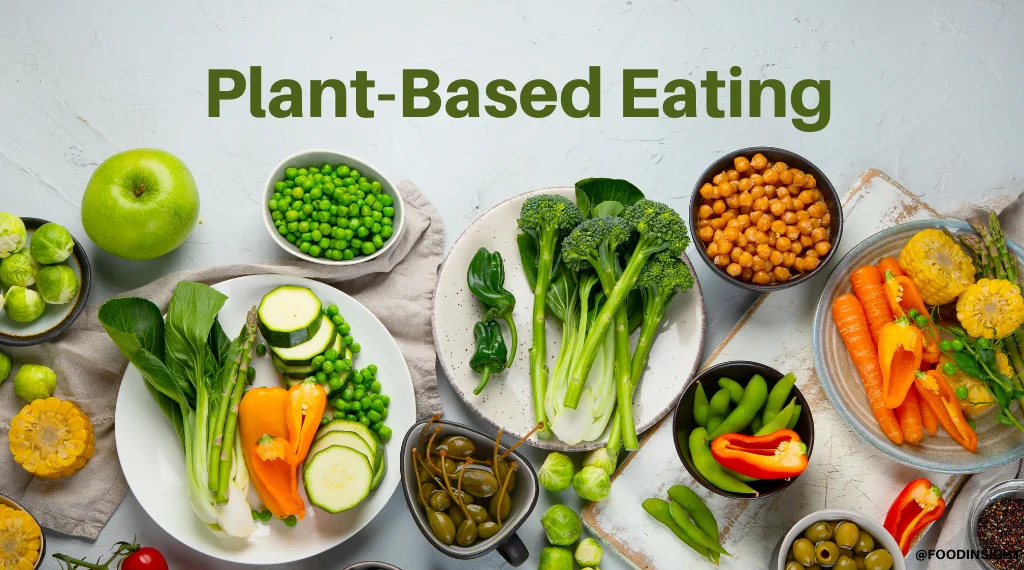Can Plant Based Beef Help You Lose Weight and Improve Heart Health?
Can Plant Based Beef Help You Lose Weight and Improve Heart Health?
Blog Article
All Concerning Healthy And Balanced Food: Advantages of Taking On Plant Based Alternatives
The conversation surrounding plant-based diet plans has obtained substantial focus over the last few years. Several individuals are checking out the prospective health advantages, nutritional advantages, and environmental impacts related to these dietary options. As people come to be extra knowledgeable about their food's influence on wellness and sustainability, questions arise concerning the functionalities of embracing such a lifestyle. What specific modifications can one expect, and exactly how might these choices improve not only individual health and wellness but additionally the earth's future?
Comprehending Plant-Based Diet Regimens
Lots of people associate plant-based diet plans mostly with vegetarianism or veganism, these diets can incorporate a vast variety of eating patterns that focus on whole, minimally refined plant foods. Such diet regimens commonly include fruits, veggies, whole grains, nuts, legumes, and seeds, while limiting or removing pet items. This versatility permits individuals to customize their nutritional options according to individual preferences and dietary demands. Some may take on a mainly plant-based diet regimen while still occasionally consuming meat or dairy products, often referred to as a flexitarian technique. The focus remains on integrating even more plant foods, which can lead to a diverse variety of flavors and meals. Comprehending these different analyses of plant-based consuming is essential for appreciating its availability and allure in modern food culture.
Health Advantages of Plant-Based Foods
The health and wellness advantages of plant-based foods are substantial, offering a nutrient density advantage that supports overall well-being. Research study suggests that these foods can enhance heart health and wellness and play a crucial duty in reliable weight monitoring. By incorporating more plant-based options, individuals may enhance their nutritional selections and advertise lasting wellness.
Nutrient Thickness Advantage
Nutrient density plays a vital function in the health and wellness benefits of plant-based foods, making them a compelling selection for those looking for a well balanced diet plan. Plant-based foods, such as fruits, vegetables, legumes, nuts, and whole grains, are usually abundant in necessary vitamins, minerals, and anti-oxidants while being lower in calories. This high nutrient density permits individuals to consume fewer calories while still meeting their nutritional needs. Furthermore, these foods are loaded with nutritional fiber, promoting gastrointestinal health and aiding in weight monitoring. By integrating nutrient-dense plant-based options, consumers can boost their general health, sustain their body immune systems, and decrease the threat of persistent diseases. Inevitably, the nutrient thickness of plant-based foods underscores their relevance in a health-conscious lifestyle.
Heart Wellness Enhancement

Weight Management Assistance
In enhancement to promoting heart health, a plant-based diet regimen can significantly aid in weight monitoring. This dietary strategy highlights entire foods such as fruits, vegetables, beans, nuts, and whole grains, which are usually lower in calories and greater in fiber compared to animal-based items. The high fiber content aids increase satiation, reducing general calorie consumption. Moreover, plant-based diet regimens are typically abundant in vital nutrients while reduced in unhealthy fats, making it much easier to maintain a healthy weight. Plant Based Beef. Research suggests that people who adopt a plant-based way of life often tend to have lower body mass indexes (BMIs) and experience more successful weight loss compared to those who take in meat-heavy diet regimens. Subsequently, embracing plant-based choices is a calculated selection for reliable weight management
Nutritional Value of Plant-Based Ingredients
Plant-based components are abundant in crucial nutrients, providing a diverse selection of vitamins, minerals, and anti-oxidants that add to total wellness. A contrast of healthy protein resources exposes that while pet items are usually viewed as superior, many plant-based options provide sufficient protein and other useful compounds. Comprehending the nutritional value of these ingredients can aid people make educated nutritional options.
Vital Nutrients in Plants
Nutrient-rich components found in plants offer a diverse selection of crucial nutrients that add considerably to general health. These ingredients are abundant in vitamins A, C, and K, which support immune function, vision, and blood clot, specifically. Furthermore, plants provide vital minerals such as calcium, potassium, and magnesium, vital for heart health and wellness, muscle feature, and bone stamina. The presence of fiber in plant-based foods help digestion and advertises a healthy intestine microbiome. Anti-oxidants, found perfectly in veggies and fruits, assistance combat oxidative anxiety and decrease swelling. Many plant foods are low in calories yet high in nutrients, making them an outstanding choice for those seeking to keep a healthy and balanced weight while making sure perfect nutrient consumption.

Comparing Protein Resources
Healthy protein sources differ significantly in their nutritional accounts, with plant-based active ingredients providing unique benefits. Unlike animal healthy proteins, which commonly contain hydrogenated fats and cholesterol, plant healthy proteins have a tendency to be lower in these unhealthy parts. Legumes, nuts, seeds, and whole grains are rich in essential amino acids, fiber, vitamins, and minerals. For circumstances, lentils supply high protein content along with considerable iron and folate, while quinoa is a complete healthy protein, using all nine essential amino acids. Additionally, plant-based healthy proteins are frequently come with by antioxidants and phytochemicals that sustain general wellness. The shift to plant-based healthy protein sources not just enhances dietary intake yet also straightens with sustainable nutritional practices, minimizing environmental effect and advertising long-lasting wellness benefits.
Ecological Influence of Plant-Based Eating
As recognition of climate modification click to read more expands, numerous people are exploring sustainable nutritional options that can considerably reduce their ecological impact. Plant-based eating has actually become a considerable contributor to reducing greenhouse gas discharges, which are mainly related to animals production. The growing of fruits, beans, vegetables, and grains commonly requires fewer resources, such as water and land, contrasted to pet farming. Additionally, plant-based diets can result in reduced logging, as much less land is required for grazing animals or expanding animal feed. By shifting towards plant-based options, consumers can support biodiversity and promote much healthier communities. Generally, accepting plant-based consuming not just advantages individual wellness yet additionally stands read the full info here for an essential step towards ecological sustainability and preservation initiatives.
Conquering Common Misconceptions
While lots of people acknowledge the advantages of a plant-based diet plan, a number of mistaken beliefs commonly hinder them from totally welcoming this way of life. A typical belief is that plant-based diets lack enough healthy protein; nonetheless, many plant sources, such as legumes, nuts, and tofu, provide ample healthy protein. In addition, some presume that this diet is expensive, when in reality, staples like beans, rice, and seasonal veggies can be rather cost effective. One more misunderstanding is that plant-based eating is extremely limiting, whereas it actually offers a diverse range of foods and tastes. Several fret that a plant-based diet might lead to deficiencies, yet with appropriate planning, people can obtain all needed nutrients, including minerals and vitamins, while enjoying a large variety of scrumptious meals. Large Tips for Transitioning to a Plant-Based Lifestyle
Making the change to a plant-based lifestyle can be an enhancing experience, though it often needs some assistance to navigate the first changes. People are encouraged to start progressively, incorporating more fruits, vegetables, beans, and entire grains into their meals while minimizing meat and dairy consumption. Meal preparation is essential; preparing a weekly menu can assist reduce the change and stop final undesirable choices. Checking out cooking approaches and brand-new recipes can also preserve and improve the experience exhilaration concerning plant-based consuming. In addition, signing up with support groups or communities can provide motivation and share important suggestions. Remaining notified regarding nutrition guarantees balanced dishes, protecting against shortages while cultivating a healthy and balanced, gratifying plant-based way of life.

Delicious Plant-Based Dish Ideas
Discovering delicious plant-based meal concepts can inspire individuals to welcome a more healthy diet regimen. One popular option is a hearty quinoa salad, featuring cherry tomatoes, cucumber, and a zesty lemon-tahini dressing. Another favorite is a savory lentil stew, packed with carrots, celery, and fragrant herbs, best for a comforting dinner. For breakfast, over night oats made with almond milk, chia seeds, and covered with fresh berries give a nutritious begin to the day. Furthermore, a vivid vegetable stir-fry with tofu and a variety of vivid veggies can be a fast yet satisfying meal. Creamy avocado toast on whole-grain bread, sprinkled with flavors and seeds, uses a basic yet savory treat. These dishes display the selection and splendor of plant-based consuming.

Often Asked Questions
Can a Plant-Based Diet Plan Provide Enough Healthy Protein?
The question of whether a plant-based diet plan can give sufficient healthy protein is usual. Various sources, consisting of vegetables, nuts, seeds, and whole grains, can fulfill protein requires efficiently, supporting a well balanced and nutritious diet regimen for individuals.
Are Plant-Based Diet Plans Appropriate for Children?
The suitability of plant-based diet regimens for youngsters depends on careful preparation. Adequate nutrients have to be guaranteed, consisting of vitamins, proteins, and minerals. With correct guidance, such diet plans can support healthy development and development in kids.
Just how Do I Dine Out on a Plant-Based Diet regimen?
Eating in restaurants on a plant-based diet plan entails seeking restaurants with varied menus, requesting alterations, and exploring vegan-friendly choices. Preparation in advance and communicating dietary preferences can boost the eating experience while keeping dietary choices.
What Are Common Allergens in Plant-Based Foods?
Usual allergens in plant-based foods include soy, gluten, nuts, and seeds - Plant Gluten Free BBQ Sauce Based Beef. Individuals complying with a plant-based diet plan should recognize these irritants and check out labels very carefully to avoid adverse responses and ensure safe usage
Can Plant-Based Diets Assist With Weight-loss?
Study indicates that taking on a plant-based diet regimen may help with weight-loss due to its normally lower calorie thickness and greater fiber web content. This mix can boost satiation, aiding people manage their caloric consumption properly. Numerous people link plant-based diet plans primarily with vegetarianism or veganism, these diet plans can encompass a vast variety of eating patterns that prioritize whole, minimally refined plant foods. Nutrient density plays a vital function in the health advantages of plant-based foods, making them an engaging option for those looking for a well balanced diet plan. Plant-based diet regimens have been shown to substantially boost heart health and wellness, as they frequently consist of elements that sustain cardiovascular function. In addition to advertising heart wellness, a plant-based diet plan can substantially aid in weight monitoring. A common idea is that plant-based diet plans do not have enough protein; nevertheless, countless plant resources, such as legumes, nuts, and tofu, offer sufficient protein.
Report this page